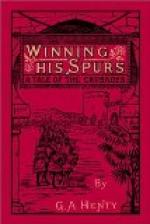Very valiantly did the garrison oppose themselves to these efforts. But each day showed the progress made by the besiegers. Their forces had been increased, Prince John having ordered his captain at Gloucester to send another 100 men to the assistance of Sir Rudolph. Other towers had now been prepared. These were larger than the first, and overtopped the castle walls. From the upper story were drawbridges, so formed as to drop from the structures upon the walls, and thus enable the besiegers to rush upon them. The process was facilitated by the fact that the battlements had been shot away by the great stones, and there was a clear space on which the drawbridges could fall. The attack was made with great vigour; but for a long time the besieged maintained their post, and drove back the assailants as they poured out across the drawbridges on to the wall. At last Cuthbert saw that the forces opposed to him were too numerous to be resisted, and gave orders to his men to fall back upon the inner keep.
Making one rush, and clearing the wall of those who had gained a footing, the garrison fell back hastily, and were safely within the massive keep before the enemy had mustered in sufficient numbers upon the wall to interfere with them. The drawbridge was now lowered, and the whole of the assailants gained footing within the castle. They were still far from having achieved a victory. The walls of the keep were massive and strong, and its top far higher than the walls, so that from above a storm of arrows poured down upon all who ventured to show themselves. The keep had no windows low enough down for access to be gained; and those on the floors above were so narrow, and protected by bars, that it seemed by scaling the walls alone could an entry be effected. This was far too desperate an enterprise to be attempted, for the keep rose eighty feet above the courtyard. It was upon the door, solid and studded with iron, that the attempt had to be made.
Several efforts were made by Sir Rudolph, who fought with a bravery worthy of a better cause, to assault and batter down the door. Protected by wooden shields from the rain of missiles from above, he and his knights hacked at the door with their battle-axes. But in vain. It had been strengthened by beams behind, and by stones piled up against it. Then fire was tried. Faggots were collected in the forest, and brought; and a huge pile having been heaped against the door, it was lighted. “We could doubtless prolong the siege for some days, Lady Margaret,” said Cuthbert, “but the castle is ours; and we wish not, when the time comes that we shall again be masters of it, that it should be a mere heap of ruins. Methinks we have done enough. With but small losses on our side, we have killed great numbers of the enemy, and have held them at bay for a month. Therefore, I think that tonight it will be well for us to leave the place.”




